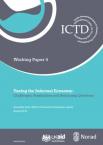ICTD Working Paper 4
Recent years have witnessed significantly increased attention to the challenge of taxing small businesses in the informal sector. However, much of this recent attention has remained focused on comparatively technical issues of revenue maximization and policy design. This paper argues that this debate should focus increasingly on the wider development implications of informal sector taxation, as well as the political and institutional barriers to improved performance.
When considering the merits of committing scarce resources to taxing small informal sector firms, debate has frequently focused on limited revenue potential, high costs of collection and potentially perverse impacts on small firms. By contrast, recent arguments have increasingly emphasized more indirect benefits of informal taxation in relation to economic growth, tax compliance and governance. These potentially broader benefits are increasingly finding support in recent research, but they are contingent on government support and consequently demand further attention. When we turn attention from whether tax authorities should tax small informal businesses towards the challenge of how to do so more effectively, we again argue that a broader frame of analysis is needed.
Most existing research has focused on developing less distortionary tax regimes and on tax simplification in order to reduce the costs of compliance. However, while important, there strategies remain too narrow. Encouraging tax compliance demands not only lowering costs but also strengthening the potential benefits of formalization, from increased security to new economic opportunities. As importantly, successful reform demands political support from political leaders, tax administrators and taxpayers alike, and thus this demands greater attention to strengthening political incentives for reform, through strategic policy, administrative and institutional reform. With this in mind the paper highlights a number of recent experiences that have sought to address these challenges, but which demand further study.
